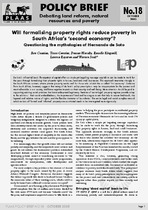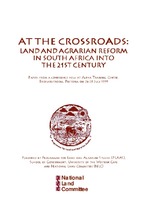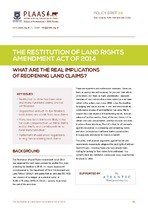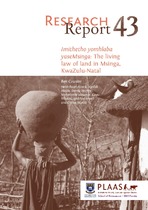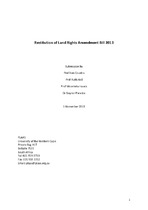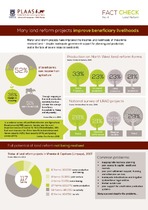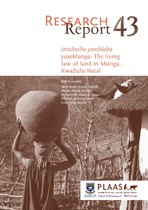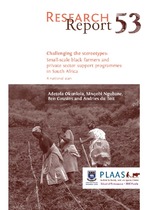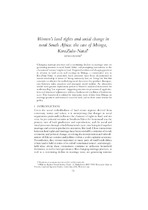Search
Now showing items 31-40 of 47
Will formalising property rights reduce poverty in South Africa’s ‘second economy’?
(Institute for Poverty, Land and Agrarian Studies, University of the Western Cape, 2005)
De Soto’s influential book The mystery of capital offers a simple yet beguiling message: capitalism can be made to work for
the poor, through formalising their property rights in houses, land and small businesses. This ...
At the crossroads: Land and agrarian reform in South Africa into the 21st century
(Institute for Poverty Land and Agrarian Studies (PLAAS), and National Land Committee (NLC), 2000)
These conference proceedings are published at a time of extraordinary fluidity and uncertainty as to the future of the ambitious programmes of land and agrarian reform1 initiated by the first democratic government in 1994. ...
What are the real implications of reopening land claims?
(Institute for Poverty, Land and Agrarian Studies, University of the Western Cape, 2014)
The Restitution of Land Rights Amendment Act of 2014
has reopened the land claims process for another five years,
extending the deadline to 2019. An impact assessment
commissioned by the Department of Rural Development ...
Imithetho yomhlaba yaseMsinga: The living law of land in Msinga, KwaZulu-Natal
(Institute for Poverty, Land and Agrarian Studies, University of the Western Cape, 2011)
This report describes the ‘living law’ of land
in one part of Msinga, a deep rural area of
KwaZulu-Natal. It presents research findings
from the Mchunu and Mthembu tribal areas,
where a three-year action-research ...
Restitution of Land Rights Amendment Bill 2013
(Institute for Poverty, Land and Agrarian Studies, University of the Western Cape, 2013)
This document represents a response from researchers at the Institute for Poverty, Land and
Agrarian Studies to the Restitution of Land Rights Amendment Bill as published on 19 October
2013. It is a statement by the ...
Many land reform projects improve beneficiary livelihoods
(Institute for Poverty Land and Agrarian Studies (PLAAS), 2013)
Many land reform projects have improved the incomes and livelihoods of those who received land – despite inadequate government support for planning and production, and in the face of severe resource constraints.
Imithetho yomhlaba yaseMsinga: The living law of land in Msinga, KwaZulu-Natal
(PLAAS, University of the Western Cape, 2011)
This report describes the ‘living law’ of land in one part of Msinga, a deep rural area of KwaZulu-Natal. It presents research findings from the Mchunu and Mthembu tribal areas, where a three-year action-research project ...
Challenging the stereotypes: small-scale black farmers and private sector support programmes in South Africa
(Institute for Poverty, Land and Agrarian Studies (PLAAS), University of the Western Cape, 2016)
This report represents one of the outputs of a research and social dialogue project undertaken over 18 months. It explores a number of private sector partnerships and projects launched in support of black farmers – some ...
Women's land rights and social change in rural South Africa: the case of Msinga, KwaZulu-Natal
(Juta Law, 2013)
Changing marriage practices and a continuing decline in marriage rates are generating tensions in rural South Africa and prompting innovations in the character of women's rights to land. Empirical evidence of changing ...
Smallholder irrigation schemes, agrarian reform and ‘accumulation from above and from below’ in South Africa
(Wiley & Blackwell Publishing, 2013)
A key issue in debates on agrarian reform in South Africa is the potential for small-scale
farming, in conjunction with redistributive land reform, to make a significant contribution to
employment creation and poverty ...

